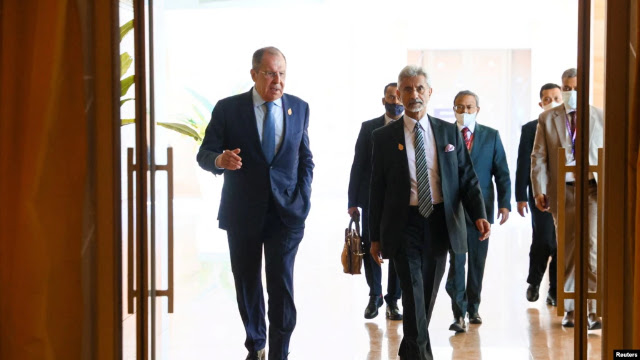Indian Foreign Minister Jaishankar begins a visit to Moscow, which is expected to focus on economic and political issues.
During the two-day visit, Jaishankar will meet with Russian Foreign Minister Sergei Lavrov and Deputy Prime Minister and Minister of Trade and Industry Denis Manturov. It will be the first visit to Russia by a senior Indian official since Russia invaded Ukraine in February.
While most have focused on India's more moderate stance on Russian aggression and India's continued purchase of cheap Russian oil and coal despite Western sanctions, New Delhi has also been using the leverage of its long-standing relationship with Moscow to stress the need to stop hostilities.
India's foreign ministry spokesman Arindam Bagchi told reporters ahead of the visit that began on Monday that India had always stressed the need to resume diplomacy and dialogue to resolve the conflict. "I'm sure the foreign minister will definitely reiterate that," he said on Thursday.
Butch said Jaishankar would "focus on economic factors" and exchange views on "regional and international development".
India has not publicly criticized Russia for creating the conflict and abstained from a U.N. resolution criticizing Moscow's aggression, but it has repeatedly voiced its opposition to the conflict and expressed concern about the violence.
"We don't think this conflict is in anyone's interest, neither in the interests of the parties involved, nor in the interest of the international community," Jaishankar said at a news conference during a visit to Australia last month.
Indian Prime Minister Narendra Modi told Russian President Vladimir Putin in Samarkand in September at a side meeting of a regional summit, "Today's era is not an era of war, I have spoken to you about this on the phone, democracy, diplomacy and dialogue. It's something that touches the world."
Modi said the world was facing major challenges such as food and energy crises, which hit developing countries particularly hard.
"India will reiterate during the visit that it needs some kind of settlement and some kind of political settlement, because this cannot be a conflict without an end," said Harsh Pant, director of the strategic research program at the Observer Research Foundation in New Delhi, "because India does not want to Criticize Russia publicly, and private conversations can certainly happen.”
The Ukraine war presents a formidable challenge for India as it tries to balance its decades-long relationship with Russia and its growing relationship with the West. It does not want to anger either side, Russia is a huge arms supplier, and fears of an offensive China have led India to strengthen its strategic relationship with the US and embrace the Quad Security Dialogue.
But New Delhi refuses to support existing sanctions or impose its own sanctions on Moscow. India has also vigorously defended its continued purchases of cheap Russian crude. India has repeatedly said that India's decision is based on national interests and that India, as a major oil and coal importer, needs access to cheap oil.
Local reports said Russia became India's largest crude supplier in October, surpassing traditional suppliers Saudi Arabia and Iraq.
But as the war in Ukraine continues, India is under increasing pressure to ensure it does not alienate the West.
"While New Delhi has always been able to explain its views to its Western partners, this window of opportunity will not last forever, and there are concerns that the longer the war drags on, the less room for India to do so," Pant said.
Observers say New Delhi's good relations with Moscow will also provide leverage. He said, “There is a feeling that India is one of the few countries where there is some kind of trust on both sides, so it is possible that India can play a more active role in any potential endeavour to resolve the conflict than it has in the past. All these extrapolations will be made at this time. Tested during the visit."













No comments:
Post a Comment